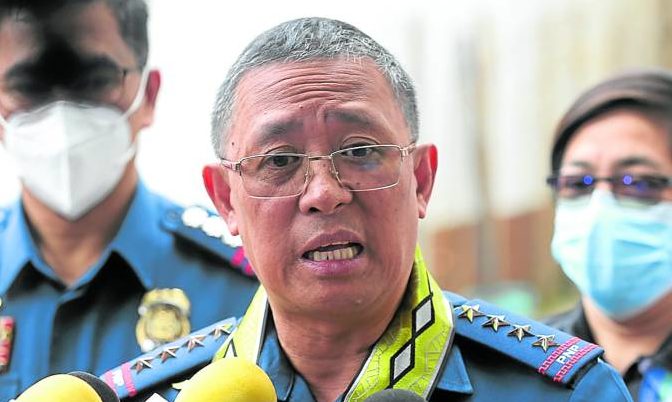PNP chief tells feuding pols: End violence, mind economy

FILE PHOTO: PNP chief Gen. Rodolfo Azurin Jr. INQUIRER / NIÑO JESUS ORBETA
Following the recent spate of political killings, Philippine National Police chief Gen. Rodolfo Azurin Jr. on Friday urged all feuding politicians to call a truce so they could focus on the country’s economic recovery amid the lingering impact of the COVID-19 pandemic.
“The health of the economy is determined by a country’s security,” he said at this year’s Strawberry Festival in La Trinidad, Benguet.
He said that if a community “is perceived to be orderly, safe and peaceful, tourists will start coming in and bring income.”
Azurin said reports on the recent assassinations of government officials had been spread around the world through social and mainstream media.
In the latest attack, several men in Army uniform and bulletproof vests gunned down Negros Oriental Gov. Roel Degamo inside his private compound in broad daylight on March 4.
Article continues after this advertisementREAD: Degamo kin to Teves: Come home, face charges
Article continues after this advertisementThe assassins also killed eight other people and wounded 16, including indigents waiting for their turn to receive government cash aid at the governor’s residence.
Degamo was the latest and the fourth victim in a series of armed attacks against local executives since President Marcos took office last year.
Lanao del Sur Gov. Mamintal “Bombit” Adiong Jr. survived the first attack on February 17; Aparri, Cagayan Vice Mayor Rommel Alameda died in an ambush on February 19; and Mayor Ohto Montawal of Datu Montawal town, Maguindanao del Sur province, also survived an attack on February 22.
Azurin said he had directed all regional police offices to conduct “threat assessments” within their respective jurisdictions to determine the level of security that elected and appointed officials had.
He said these evaluations would also help the police prepare for the barangay and Sangguniang Kabataan polls in October.
READ: Teves ready to return to PH, face accusations but…
Galvez acts vs ‘armies’
The police is advocating for the peaceful resolutions to political rifts so that communities could concentrate on rebuilding the local economy, Azurin said.
The global pandemic has bled local governments dry because almost all businesses had shut down during two years of quarantines.
“We do not need these (political feuds). Set aside these disputes,” he said.
Two days earlier, Department of National Defense officer in charge Carlito Galvez Jr. said the President had directed the military and the Philippine National Police to dismantle private armies in the country following the Degamo assassination.
Galvez spoke at the meeting of the members of the National Task Force for the Disbandment of Private Armed Groups (NTF-DPAGs) in Kidapawan City, Cotabato, on Wednesday.
READ: Former soldiers tagged as gunmen in Degamo slay ‘dishonorably discharged’ from service
Interior Secretary Benhur Abalos, the chair of NTF-DPAGs, said that while the task force was currently focused on Mindanao, the government wants to expand its coverage to the “lawlessness” occurring in the Visayas.
The NTF-DPAGs, which was created in 2015 following a peace pact between the government and the Moro Islamic Liberation Front, has monitored 22 active and 133 suspected private armed groups operating in the country.
“As we journey toward freeing the Philippines from its long-running gun culture, rest assured that the DILG (Department of the Interior and Local Government) stands ready to render any necessary assistance for the attainment of our noble objective,” Abalos said.
Long history
According to a 2018 thesis by Jandrew Taala of the US Naval Postgraduate School in California, private armies trace their roots back to the 1940s when powerful political elites used them to win elections through coercion and violence by taking advantage of a weakened state still recovering from the ravages of World War II.
They were also recruited by landlords and political clans to protect their lands and fight the communist-led insurgents who waged a peasant rebellion from 1942 to 1954.
READ: Monsod tells congressmen: Political dynasty a ‘lame excuse’ to amend 1987 Constitution
The study said that private armies “thrived” during the dictatorial rule of the President’s father and namesake, who was ousted in 1986, and during President Corazon Aquino’s administration, despite their efforts to disband them.
The dictator was able to crush the old oligarchs and their private armies but the new oligarchs that supported his regime formed their own armed groups, according to the study.
Negros ‘lawlessness’
Abalos said an interagency task force created by the President for Negros Island was intended to quell the “history of violence and lawlessness” there.
Part of the responsibility of the task force is to dismantle all PAGs and seize loose firearms in the province.
Police recently seized firearms from several properties owned by Negros Oriental Rep. Arnolfo Teves Jr., who was linked to the Degamo assassination but has not been charged.
READ: PNP: More cases filed vs Rep. Teves, sons due to illegal guns possession
Teves’ lawyers denied he had a private army and that he was worried for his security if he returns to the country from the United States since his firearms had been confiscated and his police security detail was withdrawn.
Speaking to reporters on Monday, Azurin said that some government officials maintained armed groups for their own security.
“We really need to engage our elected local officials who are in very intense political situations. The PNP should now conduct an inventory [of] who among our elected officials are maintaining private armed groups,” he said.
READ: Impunity unbridled: Gov’t targets private armies
Under a 2019 PNP memorandum circular, local chief executives are entitled to a maximum of two security officers from the Police Security and Protection Group.
In “highly exceptional cases,” they may request a maximum of six additional escorts, either from the PNP or from private security agencies.
RELATED STORY
PNP tags Degamo foe Teves in 2019 killings in Negros Oriental